- Home
- Barry Eisler
The Chaos Kind Page 3
The Chaos Kind Read online
Page 3
“I didn’t bring it to you just for the Bureau’s resources,” Livia said. “I brought it to you because I knew you wouldn’t wilt.”
Diaz started to say something and then stopped, perhaps realizing that Livia had expressed more than just a compliment. Livia understood. It was unnerving when someone saw past the façade everyone else bought into.
“Anyway,” Livia said. “When are you going to indict?”
“Statutorily, I’ve got thirty days. But I’m shooting for seven.”
“Another fait accompli for your boss?”
Diaz nodded. “And Meekler, too.”
“They’re not going to forgive you.”
“I don’t want them to forgive me. I want them to fear me.”
Livia had no doubt they would, and suspected they already did. What worried her was how far the powers that be might go. They’d killed an FBI agent, and tried to kill Livia herself, to cover up a Secret Service child abuse ring and the high-ranking politicians it implicated. What would stop them from trying to eliminate an assistant US Attorney?
She’d tried to get Diaz to be more careful. But real personal security was a hard lesson for people to internalize if they hadn’t lived through the actual need for it. And Diaz, a public school kid from Washington Heights in New York, whose parents had died when she was a toddler and who had done more to raise her little brother than the aunt and step-uncle who had taken them in, was more street smart than most. Still, dealing with predators was one thing. Professionals were a whole different level.
They stood and headed toward the door. “What about Schrader?” Livia said. “Are you sure—”
“We’ve been over this. Extra guards. Multiple cameras. Everyone’s afraid of another Epstein being suicided in prison. So for anyone thinking to try . . . it’s not an option.”
That was good to hear. On the other hand, anyone who couldn’t silence Schrader directly might decide that removing the only person serious about prosecuting him would be a sensible Plan B.
“I have an extra helmet,” Livia said. “You want a ride?”
Diaz shook her head. “It’s barely a mile.”
“It’s cold.”
Diaz laughed. “You know what it’s like in New York this time of year? It’s never cold in Seattle. Just wet.”
Livia took a good look through the window at the front of the academy before opening the door. Not so long before, this is where the conspirators had ambushed her. That was her first encounter with the really deep water, the currents Carl and Rain swam in. She’d fought her way out. But the best way to beat an ambush was to see it coming. Or to avoid it entirely.
They stepped outside and Livia locked the door. Her bike, a Ducati Streetfighter, was parked behind the building, and if she’d been alone she would have gone out the back. But she wanted to try one more time.
“Alondra,” she said. “Are you sure—”
“You said you wanted me because I don’t wilt.”
Livia glanced around. “You can stand up straight and still look behind you.”
“Fuck that. They need to be looking out for me.”
chapter
five
HOBBS
Devereaux shook his head, plainly stunned. “Schrader had videos of the president? When you were the South Carolina US Attorney?”
“Correct.”
“But he . . . That was the other party. Why would you—”
“This isn’t about parties, Pierce. And even if it were, I assure you, the issue is thoroughly bipartisan.”
Devereaux looked at him. Hobbs knew what he was thinking: At last. The matter at hand.
“Now you’re starting to get it,” Hobbs said. “You see, back then, Schrader had video of only one president cavorting with a teenager.” He paused for dramatic effect, then continued. “Now he has video of a second.”
Devereaux glanced upward as though he might see the Cabinet Room, or even the Oval Office, from where they were sitting. “You mean—”
“That’s right. Before he got into politics, when he was just an ordinary billionaire business baron. By the time these guys rise to national prominence, they seem to realize their association with Schrader isn’t good for their brands. But by then it’s too late.”
“Schrader’s blackmailing the president?”
“No, that’s the thing. The basis for the non-prosecution agreement, in fact. Schrader isn’t interested in leverage. There’s nothing he wants and can’t buy. Except one thing.”
“To stay out of jail.”
“Bingo.”
“That’s the deal you made with him?”
Hobbs nodded. “Schrader’s got a high-powered lawyer, Sharon Hamilton, and she made it clear that Schrader had created the material purely as a get-out-of-jail-free card, to be played only under the narrowest of circumstances. If those circumstances were to disappear, the material would never surface.”
“You believed that?”
“What choice did I have, really? But yes, I believed it. Schrader had been compiling the material for years. He could have used it sooner if he’d wanted to, in a variety of ways, but he never did. And the material inculpates Schrader as much as it does the subjects captured. Those videos aren’t a gun. They’re a doomsday weapon.”
The waiter came by and refreshed their coffees. When he was gone, Devereaux said, “What’s changed, then?”
Hobbs appreciated that Devereaux was being polite. The more direct version of the question would have been Why are you telling me this? Or even What do you want from me?
Hobbs took a quick glance around, but it was reflex—there was no one within earshot. And of course, the entirety of the White House was swept constantly for bugs. This was as safe a place as any to talk.
“After the non-prosecution agreement, Schrader made himself scarce in South Carolina. He bought new property—on Bainbridge Island, in Washington State. Built a twenty-eight-million-dollar compound, with mooring for his yacht and a helipad. And went back to doing what he does. He owns an Airbus ACH130 helicopter that delivers six girls at a time, a ten-minute flight from Seattle.”
Devereaux said nothing, and after a moment, Hobbs continued. “Three days ago, the FBI arrested Schrader in the Western District of Washington State. Turns out an assistant US Attorney there has been spearheading an investigation for the past year. And lord almighty, does she have the goods. Schrader’s got no way out.”
“Except one.”
“Ah, but here’s the problem. This AUSA, Alondra Diaz. She’s a zealot. I explained to the US Attorney in the district—good guy named Meekler—that Schrader can’t be prosecuted. I didn’t give details, but Meekler got the gist, and recognized there would be rewards for cooperation. He told me he’d make sure Diaz understood she had caught the wrong fish and that she’d throw him back in the water.”
“And?”
“Meekler talked to her. Standard Are you sure we have our ducks in a row talk. Nudge-nudge, wink-wink. Diaz was adamant. And she’d made sure to have lots of reporters present when the FBI made the arrest. Meekler’s afraid if he pushes too hard, someone’s going to start writing stories about it.”
“What about your non-prosecution agreement?”
“Only binding in the district in South Carolina.”
“Schrader agreed to that? That he could still be prosecuted anywhere else in the United States?”
“He didn’t like it. But if we had tried to run it through main Justice, the whole thing could have been shot down. The perfect as the enemy of the good. Schrader settled for staying out of jail in South Carolina.”
“And you settled for letting him go hunting anywhere else in the country. Like the Vatican and those priests.”
“What would you have done, Pierce? Prosecute him, and let those videos loose? Do you know how damaging that would have been?”
“Are you in those videos?”
Hobbs laughed. He’d been expecting the question, and he’d rehearsed his response.
“No.”
He waited, but Devereaux didn’t ask the question Hobbs sensed he was dying to: Am I?
“I told you,” Hobbs went on, “this isn’t about parties. It isn’t about the players, it’s about . . .” He paused and looked around the prosperous, wood-paneled enclave, then back to Devereaux. “It’s about the whole game.”
“Still. If Diaz prosecutes, your role in South Carolina is going to be headline news.”
Translation: Even if you’re not in those videos, it’s your ass, too.
“Yes. If Diaz prosecutes, I expect I’ll be one of the casualties. Though I also expect my decision not to prosecute Schrader will be slightly less fascinating to the public than videos of the implicated men fucking teenaged girls in various of Schrader’s mansions.”
Devereaux blanched, then got ahold of himself. He said, “I would think . . . after what happened to Epstein, Schrader must be worried someone could try to get to him.”
“Oh, he certainly is. Or at least was. His lawyer says he has the videos protected with some sort of dead-man switch. If something happens to Schrader, the material gets uploaded. News outlets, YouTube, social media . . . everywhere.”
“You believe that?”
“Enough so that if I were—hypothetically—thinking about how much better off the world would be without Schrader, I’d be afraid to try to make it happen.”
“Which is why you’re focused on Diaz.”
Hobbs nodded, but said nothing more. It wasn’t just intel types who understood the power of silence.
Finally, Devereaux said, “What are you asking of me, Uriah?”
“Diaz won’t respond to reason. Maybe she’ll respond to pressure. Justice hasn’t been able to dig up anything. But no one has the kind of resources you do. Maybe you can find something. Some videos Diaz is in. Who knows?”
“General Motors tried something like that with Ralph Nader, back in the day. They found nothing and the whole thing backfired.”
“General Motors was using private investigators. And that was the sixties. You’re the director of National Intelligence. In the twenty-first century. I’m betting you can do better.”
Devereaux rubbed his chin. “Threats are never useless. They’re either effective or they make things worse. What if we find something and push, and Diaz pushes back?”
Hobbs was relieved to hear Devereaux talking about we. The man was in. Of course he was. Now it was just a question of how far.
Hobbs waited a beat, then said, “I’m open to suggestions.”
There was another beat. Devereaux said, “I want to see these videos.”
“I don’t have a copy. Hamilton showed me something on some sort of encrypted website. So what are we going to do?”
Devereaux’s expression was impassive, but Hobbs could tell the man didn’t like having to go on Hobbs’s word. Or not knowing exactly what Hobbs had seen.
Devereaux sighed. “I’ll talk to Lisa Rispel.”
Hobbs nodded, pleased. “I’ve heard she’s very . . . effective.”
“That’s right,” Devereaux said. “She was my most dependable case officer when I was head of the Counterterrorism Center, and my deputy when I was director of CIA. I told the Senate committee she would make a great successor, and she has. But you knew all that.”
“I meant the black-site interrogations. People say she was willing to do whatever it took. Even eager.”
Devereaux frowned. “No one was eager, Uriah. We did what needed to be done.”
“The word is, she went to lengths that made even some of her colleagues queasy.”
“As I said: Lisa did what needed to be done. And if some of her colleagues weren’t willing to do the same, that’s on them, not her.”
“I don’t have a problem with it,” Hobbs said. “We want someone ruthless for this, don’t we?”
He might have added, And with her history, if push comes to shove she’ll be an ideal cutout, too. But Devereaux would intuit that. No need to make him uncomfortable by saying it out loud.
“All the resources of Justice are at your disposal,” Hobbs said. “I don’t know if we’ll ever be in a position to tell anyone what we’ve done here. What I do know is that whoever figures out a way to fix this will have the president in his debt.”
He wondered if Devereaux would appreciate how discreet he was being. How many face-saving asides he had offered. Because even if he couldn’t prove it in court, he sensed in his gut the truth of what Devereaux had been working so hard to conceal.
Devereaux knew Schrader. Well enough to be worried about appearing in those videos.
He only hoped Devereaux hadn’t figured out the same about him.
chapter
six
KANEZAKI
Tom Kanezaki sat in a plush chair across from DCI Lisa Rispel in the corner of Rispel’s spacious seventh-floor office, a pot of tea and two cups and saucers arrayed before them. On the wall opposite were dozens of photographs of Rispel with presidents and potentates and plutocrats, all hung so as to dominate the view, regardless of where Rispel might seat a visitor. Today, Kanezaki would have preferred the seat across from her desk. That she had invited him into the corner suggested a faux intimacy. Her warmup—a few banal thoughts with regard to his upbringing in the States by nisei parents; fulsome congratulations on ops well executed; and respectful murmurs about an impressive twenty-year rise in the ranks overall—only deepened his suspicions. Well, nothing to be done but to sip the tea, politely deflect the praise, and wait for her to arrive at whatever was the real matter at hand.
“By the way,” she said, leaning back as though the real business was done and they were now just chitchatting, “I understand that from time to time you’ve employed a contractor, a former Marine sniper—nom de guerre Dox.”
He offered a friendly smile to conceal his unease. “When it comes to contractors, aren’t we trained to neither confirm nor deny?”
She smiled back. It was a warm smile, one he imagined she had practiced many times in front of a mirror, along with the vaguely regal bearing he assumed she’d cultivated as part of an act as if philosophy. In fairness, the image had carried her to CIA’s top job before her fiftieth birthday, even in the face of widespread political concerns about her treatment of detainees.
“We are,” she said. “But I believe that’s more for testimony before the Senate.”
Kanezaki chuckled at the intel-insiders joke. He had learned early on that the key to power within CIA and the broader intelligence community was to develop your own network—for information, of course, but also for action—and Dox was one of the proverbial jewels in the crown. They’d been working together for years, initially at arm’s length, and then increasingly on the rare and surprising basis of trust. He didn’t know how Rispel had learned about the connection. Her own network, he supposed. Spies among the spies.
“I’ve worked with him a few times, yes. Discreet and reliable. Why?”
The smile faded and she eyed him coolly—a duchess losing patience with a favored retainer.
“Is he effective?” she said.
“I thought that would go without saying.”
He didn’t know why he was sparring with her. The rope-a-dope would have been smarter. Maybe because he felt protective of Dox. Not that the big sniper needed anyone else to protect him.
“Can you contact him?”
“I can try,” he said, remembering his training: It’s not enough to know your way in. You have to know your way out. “He doesn’t always respond.”
“I thought you said he was reliable.”
“About carrying out a job. Not necessarily about accepting one.”
“Compunctions, then?”
“I don’t know him that well. Sometimes he says yes. Other times no. I don’t recall him ever offering reasons.”
There was a pause, and when Kanezaki didn’t respond to the silence, she said, “There’s a man who needs to cease and desist. A formidable man best persuad
ed permanently, and from a safe distance. I’d like you to engage your contact Dox to do the persuading.”
Kanezaki thought he had heard all the euphemisms in the world, but persuasion was a new one. “Who’s the man?”
“His name is Marvin Manus. He’s military- and Agency-trained, although you’ll find no records of any of it. You see, before his untimely death, NSA director Theodore Anders employed him as something of a Praetorian guard. Anders did an admirably thorough job of deleting Manus’s personal history from government files. But we can give your contractor Dox the necessary intel on where he can be found, and when.”
Kanezaki might have pointed out that knowing the exact where and when was an impressive feat with regard to a target who sounded like a well-practiced ghost. But there was no upside to revealing his thoughts, or to the plans that might flow from them.
“All right,” he said. “What does Manus need to be persuaded to cease and desist about?”
“The thinking is that Director Anders’s untimely death was at Manus’s hands.”
“The Praetorian guard turning on the emperor?”
“I suppose you could put it that way.”
“But that’s not a cease-and-desist. It already happened.”
Rispel offered a chilly smile—something that, like the warm one, Kanezaki sensed had some practice behind it. “What did you say about this Dox discussing his reasons?” she said.
“Just that I couldn’t recall him offering any.”
“Exactly. You see, Tom, sometimes it’s safer to have nothing even to recall.”
chapter
seven
KANEZAKI
Kanezaki glanced around and immediately saw Maya sitting in the right back corner of the theater. He walked up the aisle stairs past her, munching on the popcorn he had bought, and took a seat immediately behind her. The movie wouldn’t start for another fifteen minutes, but the place was already half-full. An installment in one of the superhero franchises that had opened just a few days before.

 All the Devils
All the Devils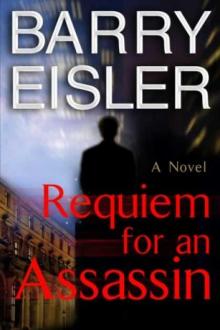 Requiem for an Assassin
Requiem for an Assassin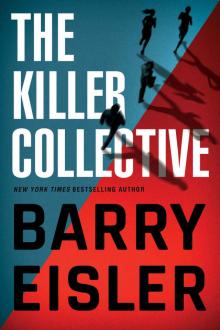 The Killer Collective
The Killer Collective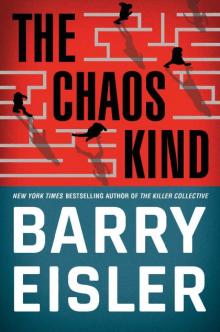 The Chaos Kind
The Chaos Kind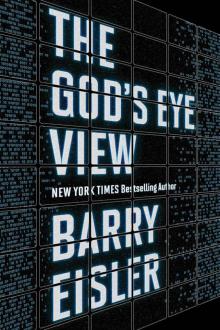 The God's Eye View
The God's Eye View Paris is a Bitch
Paris is a Bitch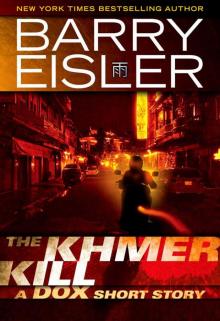 The Khmer Kill: A Dox Short Story (Kindle Single)
The Khmer Kill: A Dox Short Story (Kindle Single)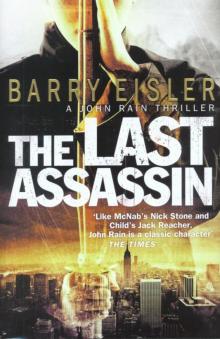 The Last Assassin
The Last Assassin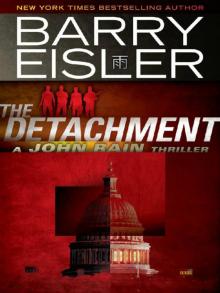 The Detachment
The Detachment The Night Trade (A Livia Lone Novel Book 2)
The Night Trade (A Livia Lone Novel Book 2)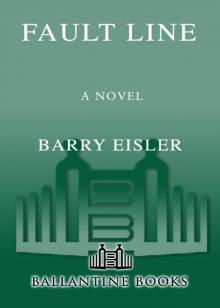 Fault Line
Fault Line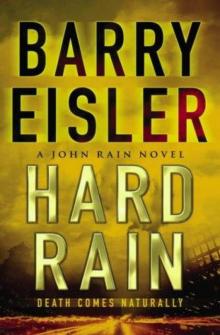 Hard Rain
Hard Rain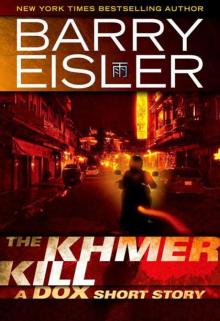 The Khmer Kill_A Dox Short Story
The Khmer Kill_A Dox Short Story London Twist: A Delilah Novella
London Twist: A Delilah Novella The Lost Coast
The Lost Coast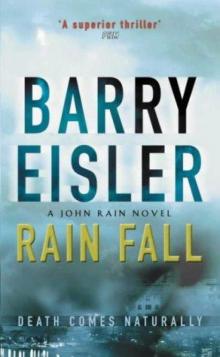 Rain Fall
Rain Fall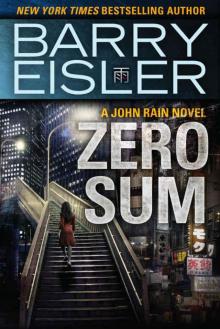 Zero Sum
Zero Sum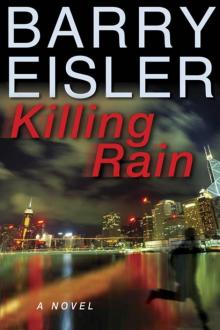 Killing Rain
Killing Rain John Rain 08: Graveyard of Memories
John Rain 08: Graveyard of Memories A Clean Kill in Tokyo (previously published as Rain Fall)
A Clean Kill in Tokyo (previously published as Rain Fall) Inside Out: A novel
Inside Out: A novel John Rain 07 - The Detachment
John Rain 07 - The Detachment Graveyard of Memories
Graveyard of Memories The Lost Coast -- A Larison Short Story
The Lost Coast -- A Larison Short Story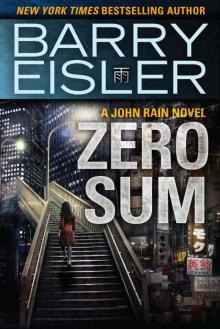 Zero Sum (A John Rain Novel)
Zero Sum (A John Rain Novel)